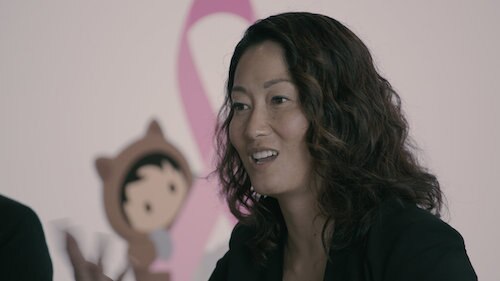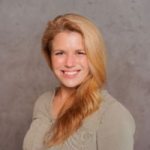Amanda West was three months into starting her job at Salesforce when she received the call she will never forget. “You have breast cancer,” said her doctor. Amanda went completely numb and remembered thinking, “This isn’t happening.”
On that day, Amanda began fighting the biggest battle of her life — a battle that inspired her to help others fight breast cancer. Nearly five years after her diagnosis, she founded Koa Life with the mission to empower breast cancer patients with the resources they need to understand their diagnosis, make informed decisions about treatment, and move forward with life after breast cancer.
Facing her options
Her initial conversation with her doctor about treatment options was overwhelming and shocking, to say the least. Amanda’s doctor tried to persuade her to move forward with a mastectomy and eight months of chemotherapy telling her, “You’re young, so your body can take it.” (Amanda was in her late 30s at the time.)
But, that leap to the most aggressive treatment didn’t sit well with Amanda — she remembers thinking, “I have a choice to get a second opinion since this doesn’t feel right.”
Amanda was relieved when the second doctor told her, “I want to preserve as much of your body as possible. You don’t have to get a mastectomy if you don’t want to. We will move forward with chemo, but let’s not give you eight months of chemo. Let’s give you four months.”
“I felt like I could have a conversation with her, versus being told what to do,” she recalls.
Treatment begins
One of the first questions Amanda’s doctors asked her before beginning chemotherapy was, “Do you have plans to have kids in the future?”
She was so thankful that her doctors mentioned fertility preservation; she had no idea chemotherapy might induce early menopause. But Amanda didn’t have a lot of time to dwell on the decision. She was told, “We need to give you chemo, so please make this decision in a week.”
This was a tough decision because seven years ago, people didn’t talk about egg preservation. With little time to decide, she went through two rounds of back-to-back egg harvesting and retrieval treatments. “Looking back, I think that process was even harder than chemotherapy. It was tough to have my body pumped up with estrogen, knowing chemo was next.”
Fertility treatment and her first lumpectomy were just the beginning of an uphill battle. After chemo, she needed a second lumpectomy because they found cancer remaining in her breast. Post-surgery she began radiation and then went through reconstructive surgery to repair some of the damage from her two lumpectomies.
After enduring fertility treatment, three surgeries, and radiation, Amanda thought the worst was over — she was cancer-free. But, she was taken by surprise when she discovered an abscess after reconstructive surgery. Two ER visits and a doctor’s appointment later, she was told she would need to treat the abscess herself with an excruciatingly painful procedure called wicking.
“This was the only time I cried during the entire treatment process,” she recalls. “Because of the sheer amount of pain and stress.”
But it was also the first time she realized, “This isn’t the end. Breast cancer is always going to be something on my mind that I will live with for the rest of my life.”
When life gives you lemons
When she was on the mend and back to work, Amanda kept to herself. She didn’t tell any of her coworkers about the nightmare she’d been through, and as she was still relatively new at Salesforce, she didn’t feel comfortable sharing details or going into how she felt. But she wanted to do something to help others who were experiencing the same things as she was.
Why don’t I help people like myself who will have to deal with everything I had to deal with” Amanda West
“Looking back, I did the best I could. I researched everything I could, but it was overwhelming. Everything on the web was, of course, very scary. I didn’t know where to go. I was sitting in support groups with people who were 60 years old versus my age; the discussions were awkward. And I felt like I was stumbling through life trying to figure out, ‘What should I do?’”
She thought, “Why don’t I help people like myself who will have to deal with everything I had to deal with? Because more people are going to get that news and they’re going to go to their doctor who will want to prescribe a treatment plan, but what if the doctor forgets something important or doesn’t know about an option that’s best for the patient?”
The more Amanda thought about it, the more questions she raised. “How do you help a person get through breast cancer? And how will they figure things out, such as the different support groups and whether they should consider fertility preservation? How do they read up about side effects they might encounter like lymphedema and ‘chemo brain?’ Once someone gets a breast cancer diagnosis, time is not on their side. Quick decisions need to be made, and it’s difficult to make them on your own.”
From her own first-hand experience, Amanda knew that there was a ton of information that existed, yet accessing it was problematic.“Why can’t there be a better resource than your doctor giving you a three-ring notebook or going to the hospital library to search through outdated content,” she wondered.
Koa Life is born
Amanda decided to take action and created her non-profit using Salesforce technology along with a few friends and coworkers to create a community and website experience where people can go to find the resources they need.
With Koa Life, she set out to personalize the patient experience by empowering them with the right information based on stage, treatment plan, and other health factors. “Every breast cancer diagnosis isn’t the same — it’s so unique. But even if you say, ‘I’ve got stage two estrogen-positive,’ it is so different from somebody else who has that same diagnosis, because of their molecular makeup. Treatment is unique to each individual,” she says.
“The long-term vision of Koa Life is that we will empower people like myself and other folks who have breast cancer to own their health data,” explains Amanda. “Hospitals can’t share patient information with other hospitals or organizations. But, individuals can share their health data with anyone — they just don’t have an easy way to do it.”
Koa Life wants to make it easy. “As you share your information, we build a profile for you, and you have the opportunity to decide what you do with that information. Whether you send it back to the provider to help them understand how to give better treatment plans, or maybe send it to organizations such as Susan G. Komen, who are researching to find a cure.”
Advice for budding Trailblazers
Amanda has learned a lot about the trials and tribulations of founding a non-profit. It hasn’t been easy, which has made her appreciate the rewarding moments even more.
Her advice to future Trailblazers interested in launching their own business comes from a place of being honest with herself about her strengths and weaknesses and being open to putting herself out there. She says her decision to find a mentor, hire an executive coach, and get out of her comfort zone by asking for help and promoting her story on social media is what helped her make Koa Life what it is today.
She encountered adversity along the way and stresses the importance of finding the confidence within yourself to move forward. “Everyone has an opinion, and it’s up to you to decide what you keep and build upon. Listen to the feedback, then learn how to walk away from some — or all — of it. Sometimes you’ll need to move on versus dwelling on it or questioning yourself or your decisions.
Learn more about Amanda’s story and how you can support Koa Life.
























